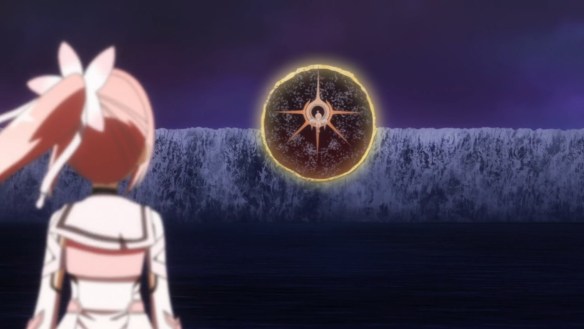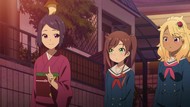Hello folks, and welcome back to Wrong Every Time. Today we’re rejoining the battlefield alongside Yuki Yuna and her companions, as our heroes fight for the last fragment of reality in a hostile, voracious world. The revelation that our heroes were sacrificing themselves as nourishment for the Divine Tree proved only the first of this story’s terrible secrets; now, they have learned that their island stands alone, the last remaining holdout of a battle between hungry gods. It is a sobering and satisfyingly Lovecraftian twist on convention; our heroes are no more than the barest eddies swirling around the movements of god-titans, sacrificing themselves only so that future innocents might live to take their place.
Having been twice over manipulated and abused by this system, and now having drawn her precious friend Yuna into the conflict as well, it is little surprise that Togo is ready to watch the world burn. If their only choices are to be sacrificed piece by piece or reject this bargain altogether, better that this paradigm be destroyed wholesale, and that a new world might be born. Togo’s loyalty to family and country made her the perfect target for the Divine Tree, but she is as fearsome in rebellion as she is in complicity, and now the walls are beginning to fall. What hope remains is aspirational, perhaps even foolish – that the collective loyalty and love of the Hero Club might conquer all the forces of heaven, a hope for which Karin gladly sacrificed her senses. And now we come to a familiar standoff, with the scenery of apocalypse furnishing that most fundamental of questions: can love truly save us?
Episode 12
We open with Yuna and Togo again facing off, Togo standing before a towering representative of the infinite vertices. I love the design of this monster – it’s essentially framed like a star-shaped keyhole, and as it splits, a chaotic red light swoops and spills from its center, followed by a swarm of the smaller vertices. An effect that’s clearly intended to evoke the gates of hell opening upon the earth
“Smile At You”
“If that thing gets through, it’ll destroy our world!” “That’s for the best. We’ll disappear together.” After having learned that her familiars will not even let her commit suicide rather than be consumed by the Divine Tree, Togo is almost grateful for this destructive force, as it at least lets her choose to die with her friend by her side
“There are people who live normal lives, completely unaware of this. We can’t give up on them.” In contrast, even given the cruelty of their own fates, Yuna is still able to accept the Divine Tree’s bargain if it means someone gets to live in peace
“That’s what being a hero means? Who cares about people I don’t know! If I can’t protect the people most precious to me, then there’s no point in being a hero.” Yuna’s naturally a more self-sacrificing person, but Togo’s position is of course also influenced by the fact that not only is this her second time round the cycle, but that she was explicitly used as a tool to recruit Yuna. Whatever else they accomplished, she still feels responsible for the suffering of her best friend
“I’ll forget about you and everyone else, Yuna-chan. I just can’t accept that!” Again, it’s the fact that Togo’s been through the cycle before that inspires her terror. She won’t just be sacrificing her body, she’ll be forgetting what she even made these sacrifices for. They’d be stealing her very identity
“I’m sure I believed I’d remember my friends. But all I remember now is that it was miserable.”
Yuna cannot rationally argue with Togo’s point, so she does what a hero does: give her a punch and then a hug
These awakened forms make their identities as priestesses all the more obvious, wrapped as they are in lavish ceremonial robes
“I’ll always be with you, so I won’t forget you.” “Really?” Togo is desperate to believe in Yuna’s conviction, but her experience has given her every reason to doubt
The next enemy through the barrier is… the sun itself? Jeez, the whole cosmos really has it out for humanity, apparently
That too fits in with this production’s interesting vision of gods and mythology. Our terrestrial defender is associated with plant life, but is almost oblivious to the lives of individual humans – they are more or less just the soil which nurtures and protects it, and their feelings are only important insofar as they can be manipulated to protect their central deity. In contrast, everything else in the universe seems to outright despise human life; the stars in the sky are all hungry gods with no pity for humanity. It’s a uniquely harsh world, closer to Lovecraftian mythos than something like Greek or Norse mythology
Yuna tries to hold off this force, but eventually burns through her energy. But here are the sisters to take her place!
And Karin charges back into battle!
Even if our heroes succeed here, I imagine their victory will come less as a wholesale repudiation of this paradigm, but instead in the form of the Divine Tree recognizing them as uniquely effective in their current formation. The tree has no better nature or sympathy to call upon, but it is pragmatic
Ooh, wonderful cuts of animation as Yuna roars her way back into fighting form. Love the tightening of her cheeks as she bellows, emphasizing her full commitment in a manner similar to the animation of Haruhi Suzumiya’s famous school festival performance
Good post-production filters here too; the scene is chaotic and almost overwhelming, but it’s never hard to discern the energy or momentum. It’s an important balance to strike, and I feel like some modern studios have reached a point of sacrificing coherency for filter spectacle
Another great cut as Yuna’s hand lightly brushes the core of this attacker. “The hero pushes forward so hard that their armor is destroyed, but their bare hands still reach their target” is always a fun beat
The girls lie in formation on the battlefield as their foe dissipates, their bodies forming the five petals of the flower in bloom
Their familiars disappear, and they are showered in petals of their defining colors, like some sort of ritual of rebirth
Establishing shots of their seaside town draw a harsh visual contrast after the battle, all muted blues and grays, the familiar colors of the mundane world
Our first glimpse of any of our heroes is Fuu back at school, praying once again to the Divine Tree. The system cannot be overcome
Meanwhile, it appears Togo can now stand on her own legs! So the system can’t be overcome, but it can be appeased, which may result in blessings or reprieves
And Itsuki got her voice back. Again, this all seems like a pragmatic calculation by the Divine Tree – most heroes are worth more to it as parts than as actual heroes, but this team has proven their distinct efficacy as warriors
Did they actually receive an honorable discharge? Their last message from the tree seems to indicate as much, but that’s no real proof of anything – they receive whatever messages the tree believes will guide them where it wants them to go
“All we can do now is trust our successors to take over.” A bleak thought, but it’s really all they can hope for
Nonetheless rewarding to see Fuu and Karen conversing so comfortably. Karen has truly integrated into the group now, there’s no tension between them
Meanwhile, Yuna’s still unresponsive since the battle
They decide to keep their school festival skit as-is, a symbol of their faith that Yuna will awaken in time to perform. A graceful way of tethering their battles back to the hero club, which was always the purest representation of their dedication to their community. Each small act of community service is a gesture of faith extended towards their town, time and labor given freely with no expectation of reward. The divine tree corrupted this charitable instinct by lying about the bargain they were making, but back in the hero club, our team is reasserting their original values, demonstrating that even the divine tree’s cruelty has not made them jaded, has not undercut their trust in each other or their home
Togo reads a story of heroism to Yuna, a story emphasizing how the most fundamental quality of a hero is “hope in hopeless times,” an unerring belief that a better future is possible
“Even when she was alone, the hero never gave up fighting.” Few can match such a hope, which means being a hero is an ultimately isolating experience
As Togo breaks down, we see she was also talking about herself. Yuna promised she’d always be beside her, but now Togo is left alone
It’s an interesting riff on the Madoka paradigm, with Togo obviously slotting into the Homura role, and slowly revealing she’s the actual protagonist
Gorgeous expression work for Togo as Yuna finally awakes
Love the detail of Karen being mad that Yuna shows up at their clubroom before they finished hanging her welcome back poster. You gotta do these things in the right order!
“I wonder if the Divine Tree helped you?” “I don’t think it did.” Togo rightfully doubts the tree’s investment in the ultimate fate of its soldiers, even its most loyal and effective ones
A return visit to their diner serves as the key affirmation of their return to normalcy, calling back to both their prior fear of not enjoying idle excursions like this anymore, as well as Yuna’s renewed sense of flavor
That callback is then matched with their festival performance, a full-stage reenactment of the puppet drama that opened the season. Our heroes, not being forced to sacrifice and suffer in silence, but demonstrating the spirit of heroism that they might inspire others in their community. Heroism is always to a certain extent a performance – a theatrical interpretation of strength designed to assure others they can be strong as well
And though she collapses near the end of her performance, she is immediately lifted again by her friends – an embodiment of their pledge, their determination to always carry each other forward
And Done
Excellent work, hero club! In spite of being tasked with sacrificing your bodies to power a morally indifferent overseer in an unending war of celestial deities, you were able to earn yourselves an honorable discharge, escaping your fates through collective trust and pure strength of conviction. I appreciate how this finale was able to thread that difficult needle, giving our stars the victory they deserved without undercutting the horror and inhumanity of the system they were participating in. There is no “perfect victory,” but there is still hope that our dedication to each other might lead us to a happier ending – and in this episode’s epilogue, our focus rightfully returned to the spirit of kindness and mutual aid that actually made Yuna and her friends special, something their overseers could never truly appreciate. In a world defined by amoral forces beyond our control, we must cling all the more fiercely to our faith in and love for each other. Whether we succeed or fail, that is all we can hope might save us.
This article was made possible by reader support. Thank you all for all that you do.




